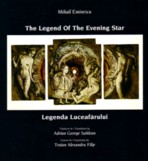| Translator's Note
I started to translate Eminescu out of sheer love. Although long frustrated by the limits of translatability, I still wondered how Eminescu's musicality and simplicity of expression could be suggested in English. The 'Legend of the Evening Star' owes its moving power not to a small degree to the way it is told in Romanian. 'Luceafarul' has an elusive but instantly recognizable 'music' as when we read Shakespeare aloud or we listen to Bach, Chopin or Vivaldi. This is a major challenge for any translator and underlies the resigned feeling, shared by many, that Eminescu is untranslatable.
I did not want to give up on one of the world's greatest myths without trying. However, I started 'The Evening Star' from the 'concord of sweet sound,' with the rather grandiose idea that transposing the 'music' will keep me close to the content. Luceafarul's vocabulary is simple without being simplistic. The words are rarely sophisticated and it is indeed the coincidence of familiar, almost commonplace, locutions and the unexpected depth of meaning that is uncanny. This deceiving simplicity is used to create archetypal imagery that evokes depth and universality of feeling rather than some unique or exotic emotion. Can simple words be combined in English with similar musical effect without sounding simplistic?
Most translations seemed resigned before the musical potential, different in the two languages. Simplified, the case could be stated as follows: English is a language with mono- or bi-syllabic words and 'closed' vowels while Romanian has plurisyllabic words and open-vowels; English poetry strives toward efficiency, actively avoiding superfluous syllables (like the definite articles) while in Romanian the unavoidable flexionary forms are used purposely as musical material.
Translations of Eminescu have generally imitated 18-th and 19-th century English poetry. Moreover, the tenet seems to have been that good translations avoid common words. To give Eminescu imposing stature, he was presented in the traditional attire of royal British poets while what is majestic about him comes from depth of content in simple clothes. The result was highly sophisticated language and syntax in the style of Byron or even Shakespeare while the sound was abandoned from the start, as a given.
My translation did not attempt to modernize either vocabulary or grammar. Some formulations may sound contemporary but this is also the case in Romanian! Other locutions are 19-th century but neither vocabulary or syntax is archaic. I intentionally avoided forms like 'doeth', 'thou', 'did speak', 'thy', etc. While such conventions characterize Romantic English poets they would not be useful to suggest Eminescu's much more simple vocabulary.
While traditional renditions from Eminescu have leaned toward archaization, the current literary criticism in the US strongly favors modernization of any translation language. To be effective for today's readership (the argument goes) language needs to match the spontaneous emotional outbursts of contemporary English. Meter and rhyme are deemed conventional and formulations of olden times would fall on emotionally deaf ears.
Poetry itself, with some exceptions, reflects the above. Lyrical pleasure is expected more from surprise of information than from harmony of matching sounds. Like many things in this century, poetry has moved, pragmatically, towards efficiency. This is understandable. After so many years of 'matching,' most rhyming combinations, now tabulated in dictionaries, have been used up. Moreover, in a pervasive mass media culture, both journalism and commercials have fostered their clicheization, simply accelerating a natural process of inflation. However, while the accepted format is a freer verse, a faulty assumption grows that 'obsolete' rhyme-and-rhythm is fit only for facile content.
The present translation followed neither of the two directions mentioned. My intention was from the start to give English speakers a sense of Eminescu's unique sound and style rather than fit him into expectations. Paradoxically, this approach allowed me to be truer to the content. To me, Eminescu is akin to the music of Mozart or Vivaldi: the sound combinations seem simple and predictable but the cumulative effect has serenity and a soothing depth that cannot be explained through its components. The sum is bigger than its parts. The harmonies, commonplace from contemporary perspective, do not make the music any less enjoyable.
In a way, Eminescu's music had to be reinvented in English. But no more than, say, any transposition of a Bach cello suite for guitar has to explore sonorities not customarily used by the instrument. The above is meant as an invitation to listen to the sound of Eminescu in English beyond hearing content. Read it aloud!
Adrian George Sahlean
|




